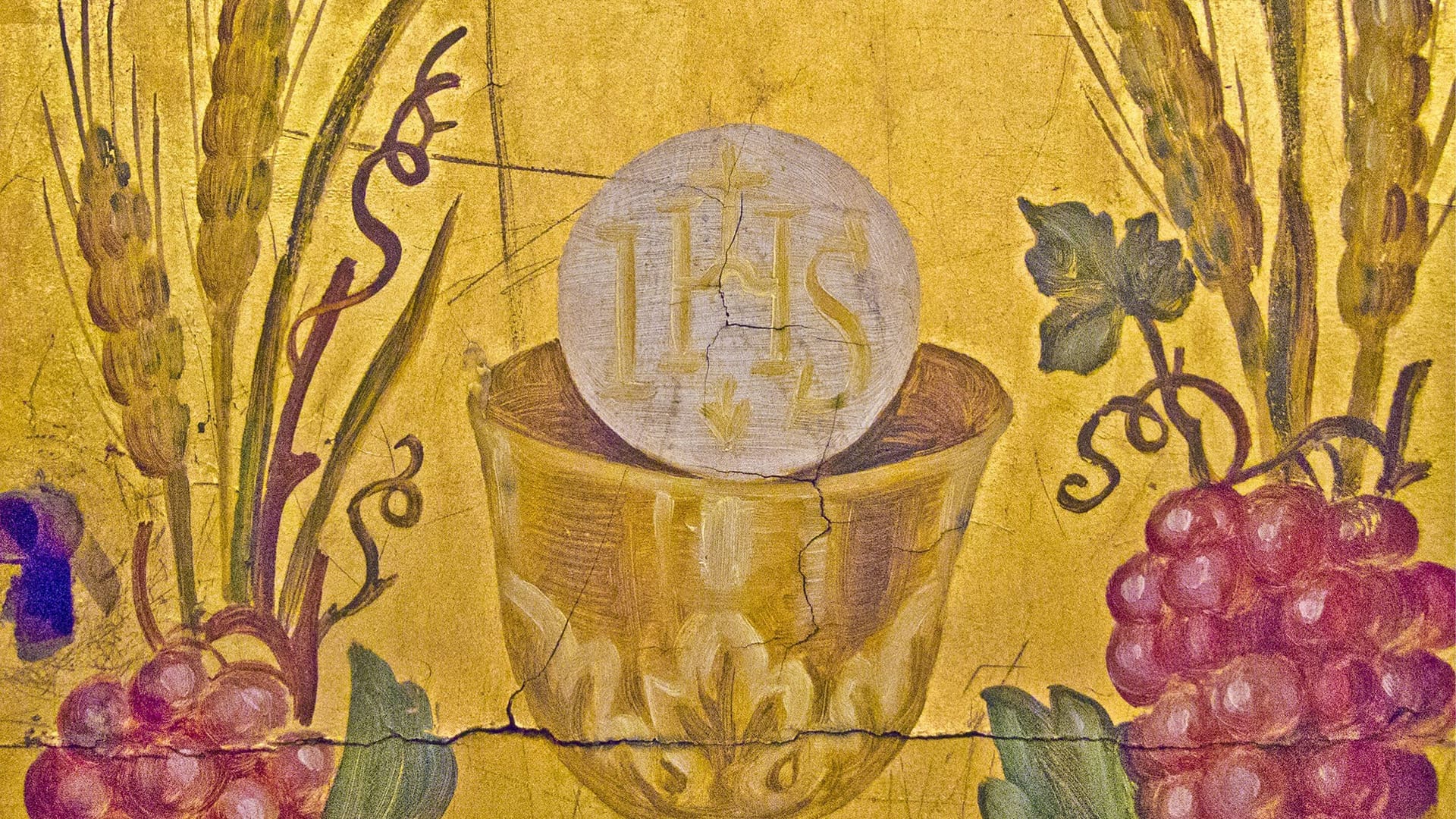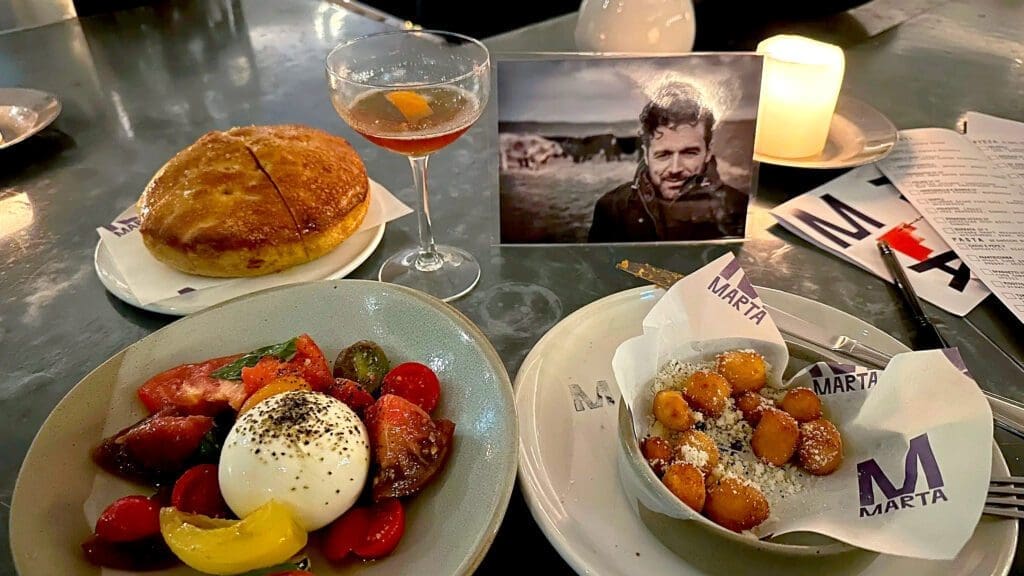T
The first time I remember hearing “Let All Mortal Flesh Keep Silence,” I was in the nave of All Saints’ Church, St. Andrews. The incense plumed from the thurible while seven lamps shone above the altar in the sanctuary. The grey stones of the church absorbed the light from the old fixtures, lending the room the kind of ambience just about perfect to see the hymnbook and to appreciate the candles and lamps glowing with living fire.
The priest and deacon wrapped the ciborium and wine cruet in white linen and donned liturgical vestments whose name I—to this day—do not know, despite now being a priest myself. The thurifer made his way down the steps while behind him the acolytes carried the candles before the sacrament. As the sacred ministers approached the first row, the people knelt. The pungent frankincense filled the nave. Row by row we knelt as the body and blood of Christ were carried through the nave to the Lady Chapel, where the sacrament would be reserved during the Watch of Maundy Thursday until Good Friday.
During this procession we sang,
Let all mortal flesh keep silence
and with fear and trembling stand;
ponder nothing earthly-minded,
for with blessing in his hand
Christ, our God, to earth descending,
comes our homage to command.
Kneeling, the smell of incense, the words from a liturgy dating to the fourth or fifth century. The emphasis on Christ’s descent while the sacrament literally descended the steps into our midst. These things were sunk deep within me.
So deep, in fact, that I’m not certain the memory is accurate. We could’ve been saying Psalm 22, “My God, my God, why have you forsaken me.” That’s what the liturgy calls for. Still, it’s possible we sang the song before beginning Psalm 22 at the stripping of the altar.
In spite of that ambiguity—the possibility that my memory is wrong—the image, the sensations are so vivid that I question it only for your sake. As far as I’m concerned, that moment is my first contact with such a beautiful hymn. Keep silent; Christ is coming down to earth, demanding our homage, descending with smoke and fire, under the guise of bread and wine.
Augustine’s discussion of time in Confessions is so famous that even contemporary physicists quote it. Time, he suggests, is a distentio—a sort of stretching out or tension—within the human mind. He’s not saying time is subjective. He’s saying the human mind is where we find the relationship—and the difference—between time and eternity.
It is not a neat and tidy relationship. The moment we begin to contemplate the present, we become conscious of just how fragmented our very self is. Our memories of the past interrupt our contemplation of the present, and our preoccupations with the future, derived from the past, do the same. We are stretched between the anticipation of the future and the memory of the past. Neither of these, strictly speaking, exists. Even when we do contemplate the present, still we are that distentio, our present moving into the non-existence of the past.
Augustine stresses that God can call something into being, can create time without a distentio in God’s being, and at the same time names Jesus as the mediator. We might say that Jesus, as God, acts without distentio while, as a human, he is a distentio. In other words, the Word through whom time and space came into being became himself an enfleshed human being. Eternity touches time in the present such that the eternal Son has a past and a future precisely because he has a human mind and body.
I heard “Let All Mortal Flesh Keep Silence” more times than I can count at All Saints’. None of them sticks out besides the first one. Any repetitions of it simply reinforced that initial memory: Holiness descending. A cloud of incense filling the room. The smell of frankincense and charcoal burn. Candle flame and kneeling in humble reverence.
The next concrete memory of hearing that song was at the funeral of my son, Asher. I say concrete, but that isn’t quite right. I know we sang it because I remember it was one of the hymns. I don’t remember the singing itself.
I remember seeing him in the tiny coffin in his white gown, the coffin the undertaker sealed and, after some time, carried awkwardly up the aisle. It was too small for two to carry, but it looked—dare I write what I thought at the time—silly for one mildly overweight Englishman in his tails to attempt to carry it with dignity. I remember our friend Julian singing “Of the Glorious Body Telling” loudly enough to lead us because he alone recognized the tune we had selected. Once more a eucharistic hymn. I remember the coffin before the altar and Anna, our priest, walking around it with the thurible. I don’t remember a cloud of smoke. I remember the whitewashed walls of St. Bene’t’s, Cambridge, and that Justin had driven hours to attend the funeral, that he shook my hand with tears in his eyes and walked out the door without a word, to drive back home to be with his wife and children.
In Beyond Good and Evil Nietzsche says, “Profound suffering makes you noble; it separates.” It’s a dark thought, but one I find myself in deep sympathy with. Suffering—and here I mean something serious, the kind of thing we might label as trauma—does individuate you, does separate you. You feel like you’re going through it alone.
It’s why survivors of childhood abuse suffer from PTSD in ways that, say, many survivors of 9/11 didn’t. The very person a child might go to for help is the person they cannot confide in, while an entire city went through 9/11 together. Profound suffering individuates you. It can also isolate you.
That’s the dark side of suffering. Rather than enabling you to see the world as it is, you get stuck in the past. Your mind cannot always delineate past from present. You cannot look toward the future. The most unpredictable of triggers brings immediately to the present the reality you endured in the past. As Bessel van der Kolk says in The Body Keeps the Score, “When people fully recall their traumas, they ‘have’ the experience. They are engulfed by the sensory or emotional elements of the past.” They can’t hold it apart from themselves. They relive it in their bodies.
In Augustine’s terms, memory overwhelms contemplation of the present. While our bodies are in the present, our minds are consumed by the past. The one who has suffered deeply has, to use a phrase from Confessions, “burst apart in time.” Our minds occupy both the present and the past.
If, as van der Kolk says, the past “engulfs” the senses, then memory has literally brought the past into the present such that it affects the body. Your mind is in two times while your body is in one time because your body is not a time machine.
I need to emphasize I’m speaking literally.
The one who has suffered deeply has, to use a phrase from Confessions, “burst apart in time.”
To cast your brain somewhere else is not necessarily bad. Even Augustine talks about how “memory is the present of past things.” When you lose control, however, when you are present in body and soul and then, suddenly, through no effort of your own, your mind occupies the past in a way that affects your physical body, that’s something else. It’s destructive, because your body cannot be pulled into the past, cannot burst apart in time the way your mind can, and yet the traumatic memory is so powerful it tries to do just that.
Perhaps, as Nietzsche says, that is a form of nobility. Perhaps, as the Christian tradition says, it is a wounded manifestation of the image of God. I’m pretty sure those are your only two options.
We buried our son in Cambridge, England, in the churchyard of St. Bene’t’s, which celebrated its millennial in the summer of 2020. It felt right to leave our son in the care of the ancient church that had prayed for him, into whose immediate fellowship he had been baptized. We returned to the United States.
One Sunday, worshipping at Trinity Church, Iowa City, the tune began for “Let All Mortal Flesh Keep Silence.” I started singing. I love that song because of All Saints’. I could see the stone walls. I could smell frankincense even though Trinity’s thurible was tucked up in a cupboard.
And then we sang:
Rank on rank the host of heaven
spreads its vanguard on the way
as the Light from Light, descending
from the realms of endless day,
comes the pow’rs of hell to vanquish
as the darkness clears away.
I stood in St. Bene’t’s church and saw Asher’s coffin before the altar. I saw his body in that tiny coffin. I was in the NICU with the beeps of the respirator and the heart monitors. Astringent soap and bleach smell. I sat there while he tried to cry and couldn’t.
My body was crying and my heart rate was up and I was shaking. But I didn’t notice. My mind was present in the past, and my body felt like it was there too. But I was in that church in Iowa City. My body in one time, feeling the literal tug back to where my soul or mind was.
If, as Augustine says, the past doesn’t exist, then a person suffering from PTSD is drawn backward toward something like non-existence. That pull in their mind has physical effects. That’s how we know we’re dealing with something more than memory. It’s the very tension of being in two times but only one place at the same moment.
Of course, there is a positive way to articulate this ability of the mind to plumb what doesn’t exist; I’ve already suggested it is part of being created in the image of God. We can sit in one place and, without a distentio of the body, find ourselves in a completely different time and place in our minds, whether through memory or anticipation. We can plumb the past as though it still exists. In doing so, we can anticipate the future. We can contemplate the present. With our minds, we can call back into being those things that have lapsed into non-existence or summon forth those things that don’t yet exist.
The discontinuity with God should be clear. For one, God is always present in both senses of the word: present as neither past nor future and present as presence.
That discontinuity offers a way to think about what occurs in those moments when our mind tries to tug our body back into the past. We feel the tension precisely because we are made to be present, body and soul. The present, of course, is God, existence itself, the one who is here, now, presence itself. And yet we live in a world where that is often not our conscious experience.
Perhaps we can go so far as to say that, in moments when our past suffering overwhelms us, God is—somehow—less present to us precisely because of our inability to locate ourselves in the present. I do not mean that God is absent. Certainly God can be—in some way—more present in moments of suffering than in moments of peace. Otherwise, what do we do with the cross?
And yet, if we can speak of there being something like more density to God’s presence in Jesus—or even in what Celtic Christianity calls “thin places”—then we must be able to speak about there being less density to God’s presence in certain moments of our own lives. However we talk about it—and I have reached the limits of language—our past trauma and its overwhelming us in the present need to be healed.
When our second son was born, he and I were rushed out of the operating room because something had gone wrong in surgery. My wife was in danger. In the two hours after getting rushed out of that room and to the NICU, I was told that my son might also be facing complications. Nothing really to worry about, they said, though it turned out they were wrong.
He lay in an isolette, enduring what was then relatively experimental: cooling therapy. Monitors beeped and breathing machines whirred. Just twenty feet away my wife was going through emergency surgery, and there I was, alone, having to make decisions about our son’s future.
Once they had him stabilized, I locked myself in a bathroom. I couldn’t breathe, and my heart rate was probably dangerously high. I remember a mirror and LED lights and thinking I should feel like vomiting, but really all I felt was clammy and hollow. No one checked on me until the surgeons came in to say my wife was stable—but only after one of them made a joke that I still struggle to forgive. Of course, that medical team did not know our history.
I have never felt more alone—more individuated, you might say—than I did over the weeks and months that followed. I bore most of the responsibility for a child who had had a stroke, while trying—and failing to the degree that my mother-in-law had to come stay with us—to take care of my wife, who was herself deathly ill.
And I wasn’t even the one suffering the things! I was the one watching the suffering.
Asher was dead. His body buried in one place, his soul at rest with the saints. That can be put into a narrative about how a hymn triggers you. But when a body is broken, you carry it with you through life. It affects your mind. When you watch a beloved child suffer before he has even had a chance to screw up, well, that can break you. Yet you can’t let it, otherwise who would take care of him?
There are two parts of the eucharistic liturgy: doing and saying, ritual and word. In what Anglicans call a Solemn Mass, we find a good balance of the two. After the bread and wine are brought forward, the priest faces the congregation and says, “Lift up your hearts.” To where? “We lift them to the Lord.”
We are stretching out to a place without physically moving there.
The priest turns to the altar, and the most trinitarian of prayers unfolds as the priest prays the prayer of the people. The people’s attention is hyper-focused. Kneeling, they listen and await their Lord’s presence. They contemplate the present words spoken about past actions as they anticipate the future.
Still addressing God, the priest now reaches what is called the anamnesis, where the words of institution are repeated and remembered. But anamnesis isn’t just remembering. It is making present in the moment the reality of the past. So here we have a density of God’s presence in time. Past acts entering the present.
The very movements of our bodies in space and time orient us to both. We have knelt facing the altar. We look toward the bread and wine. Ourselves as distentiones, stretched between the past and future, our minds attuned to the vanishing present as time dilates, as the past actions of Jesus begin to fill the present, where we kneel in hopeful expectation of the Lord’s presence.
Christian faith is grounded in a specific time and place, that moment when, in Jesus, time was hallowed and its move toward non-existence reversed. The words the priest says make that moment present in some real sense: “Recalling his death, resurrection, and ascension, we offer you these gifts.” The gifts are bread and wine.
Here we have reached the holy of holies. We ask God to send the Spirit on the bread and wine so that they—somehow—become the body and blood of Jesus. We also ask for that same Spirit to be poured on us so we can receive them. The Holy Spirit poured on us by the Father, uniting us to the Son, who unites us to the Father. The priest elevates the bread and wine, an offering to God, the very one Jesus himself made—once, for all—on the cross.
In other words, we are caught up in the sacrifice Christ made outside Jerusalem. That past moment is present now for us, and we are taken up into it, our very bodies oriented toward the bread and wine offered to the Father, through the Son, sanctified by the Spirit.
And now we pray the Our Father, and the phrase “daily bread” takes on resonances that point beyond thinking about the here and now. Because something else is happening. When the priest breaks the bread, these words may be said: “Christ our Passover is sacrificed for us.” Not was: is.
The people are invited to receive of the Lord. We don’t stay in the pews. We go forward. And if someone cannot go forward, the deacon and priest take the Lord to them. Either way there is movement, a taking up of our bodies into the past actions of Jesus our Lord.
Our minds and souls, capable of bringing memories into the present, though, are one part of that lingering image of God that cannot be destroyed.
Here we catch a glimpse of the proper way for past and future to coincide in the present: memory interrupting it, certainly, but in a way that brings healing. Think back to the two definitions of “present”: both coming from God, who just is the present, who just is present. A human act in the past—Jesus’s self-offering—is brought literally into our present. A density of time as well as of place: Jesus himself is present physically in the guise of bread and wine. And through him the church prays; we offer ourselves, our souls and bodies.
I am not suggesting that receiving the Eucharist will heal trauma. I’m suggesting that PTSD is a malfunction of our fallen brains’ relationship to time and place. We are made to occupy the present, God present to us. But we live in what the theologian Paul Griffiths calls “death time,” time tending toward non-existence, our bodies moving forward in time toward our deaths.
Our minds and souls, capable of bringing memories into the present, though, are one part of that lingering image of God that cannot be destroyed. They can make present for us the past, bring back into being things that have vanished. In doing so, our memories allow us in some way to dwell as we will dwell in the present that is God.
Events can disrupt that, can break that good thing within us. That’s why trauma and PTSD are so very destructive of a person and their relationship to self and to others. If a beautiful thing is wounded, the damage is all the more evident.
In the movement of the liturgy, in the movement of our bodies toward a whole and healing memory, an anamnesis making the past present, we catch a glimpse of how God has blessed us with memory and how God works to heal our broken memories. Because we do not make Eucharist alone. We do so in the company of the faithful, those who are oriented to the present by understanding how God acted in the past and, precisely because God did so in the human Jesus, how God acts in the present and will act in the future. The eternal God has hallowed time by entering it.
We find ourselves in the liturgy aligning our bodies and our minds. We can exist simultaneously in the past with Jesus and in the present with his body and blood and in the future with angels and archangels and the whole company of heaven. Body and soul. Without disruption. The hallowing of time works its way out through time.
But we can go further. Consider the way some Christians genuflect to the tabernacle, where the reserved sacrament dwells. Consider how we bow to the altar on which bread and wine become Jesus’s body and blood. These things show that we feel the way the Eucharist—as a particular form of memory, a particular way of bringing the past into the present—hallows space, physical objects. Us, our bodies who have eaten Christ’s body and drunk his blood. It’s not just that we’re remembering Jesus. It’s that we’re taking him into us. This act makes us holy in a way we weren’t just a little earlier. If that is the case, it must also affect the other physical objects: the altar, the unconsumed bread and wine, the tabernacle or aumbry in which it is stored.
The Celtic idea of thin places is not a metaphor. There are, indeed, physical places where God’s presence can be felt more acutely than in others. That is one way God redeems time and space.
Where might you find such spaces? Perhaps start with churches. The older, the more prayers prayed in them, the more Eucharists celebrated within them, the better. And, by all means, stay for Communion.
More than a year after Asher’s brother was born, we took him to visit Britain. Our final Sunday, we attended Mass at St Bene’t’s, where just beyond the walls his brother is buried. Our son was a quiet child. Because of his stroke, we sometimes worried that he was too quiet. Sitting beneath the belltower, my wife and I were of course conscious of the ashes of our child lying buried in the ancient churchyard. I’m sure it was bittersweet. I remember going out and visiting his grave after the service. But what overwhelms my entire memory of that day is the fact that, just before being invited forward to the altar, our son realized he could shout, “Aaah!” and his voice would echo. The whole way down the aisle toward the altar, he shouted at the ceiling, to hear his voice echo back down. I was probably horrified at first. But I remember smiling faces, some of whom were present at his brother’s funeral. I remember finding it hilarious. I remember feeling in my very bones that that ancient space was suffused with holiness.
This essay began as the 2023 Bruner-Welch Lecture at Whitworth University. I am grateful to Adam Neder for the invitation as well as to the students and faculty for their probing questions and insightful comments.






